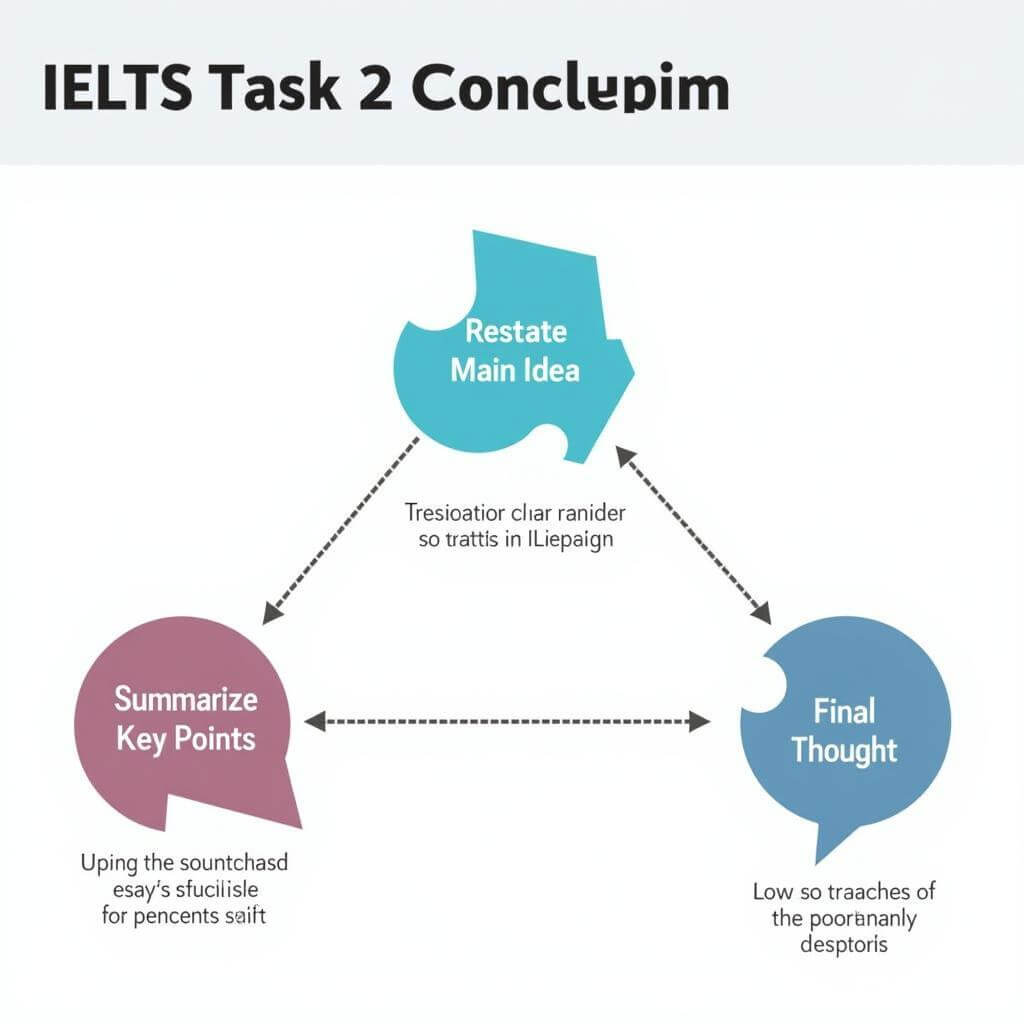IELTS Task 2 essays require a well-crafted conclusion to leave a lasting impression on the examiner. Writing strong task 2 conclusions is crucial for achieving a high band score and demonstrating your ability to summarize key points effectively. In this comprehensive guide, we’ll explore expert strategies to help you create powerful conclusions that will boost your IELTS Writing score.
Understanding the Importance of Task 2 Conclusions
A strong conclusion serves as the final opportunity to reinforce your main arguments and leave a positive impression on the examiner. It’s not merely a repetition of what you’ve already said, but a concise Sum up of your essay’s core message. Let’s delve into why mastering this skill is essential for IELTS success.
The Role of Conclusions in IELTS Task 2
Conclusions play a vital role in:
- Summarizing your main points
- Restating your position on the topic
- Providing a final thought or recommendation
- Demonstrating your ability to synthesize information
Dr. Emma Thompson, a renowned IELTS examiner with 15 years of experience, emphasizes: “A well-crafted conclusion can elevate an essay from good to excellent. It’s the last thing the examiner reads, so make it count!”
Key Elements of a Strong Task 2 Conclusion
To write impactful conclusions, focus on incorporating these essential elements:
1. Restate the Main Idea
Begin your conclusion by rephrasing the essay question and your thesis statement. This reminds the reader of the central topic and your stance.
2. Summarize Key Points
Briefly recap the main arguments you’ve presented in your body paragraphs. Avoid introducing new information at this stage.
3. Provide a Final Thought
Offer a broader perspective, a prediction, or a call to action related to the essay topic. This demonstrates your critical thinking skills.

Techniques for Writing Strong Task 2 Conclusions
Mastering these techniques will help you craft compelling conclusions:
- Use clear transition signals (e.g., “In conclusion,” “To sum up,” “Overall”)
- Employ varied vocabulary to avoid repetition
- Keep it concise – aim for 2-3 sentences
- Maintain a formal tone consistent with the rest of your essay
- Be crucial for + noun/gerund when emphasizing importance
IELTS expert Sarah Johnson advises: “Practice writing concise arguments in task 2 to develop the skill of summarizing effectively in your conclusion.”
Common Mistakes to Avoid
Steer clear of these pitfalls when crafting your conclusion:
- Introducing new ideas or arguments
- Simply repeating your introduction word-for-word
- Using informal language or clichés
- Making absolute statements without evidence
- Writing excessively long conclusions
Examples of Strong Task 2 Conclusions
Let’s examine some IELTS Writing Task 2 conclusion examples? to better understand effective conclusion writing:
Example 1: Technology and Education
“In conclusion, while technology offers numerous benefits to education, it’s crucial to implement it thoughtfully. Balancing digital tools with traditional teaching methods and addressing potential drawbacks will be key to harnessing technology’s full potential in the classroom. The future of education is likely to be a blend of innovative tech solutions and time-tested pedagogical approaches.”
Example 2: Environmental Conservation
“To sum up, tackling environmental issues requires a multifaceted approach involving governments, businesses, and individuals. While challenges remain, the increasing global awareness and collaborative efforts make it all but certain that progress will be made. By combining policy changes, technological innovations, and personal responsibility, we can work towards a more sustainable future for our planet.”
Practicing Your Conclusion Writing Skills
To improve your ability to write strong task 2 conclusions:
- Analyze sample essays and identify effective conclusion techniques
- Practice writing conclusions for various IELTS Task 2 topics
- Time yourself to ensure you can write a strong conclusion within the exam time limit
- Seek feedback from teachers or study partners on your conclusion writing
Remember, as IELTS writing coach Michael Lee states: “Consistent practice in conclusion writing is crucial for developing the skills needed to excel in IELTS Task 2.”
Conclusion
Writing strong task 2 conclusions is an essential skill for IELTS success. By understanding the key elements, employing effective techniques, and avoiding common mistakes, you can craft impactful conclusions that leave a lasting impression on the examiner. Remember to practice regularly and seek feedback to continuously improve your writing skills. With dedication and the right approach, you’ll be well-equipped to tackle the IELTS Writing Task 2 with confidence and achieve the band score you desire.
Frequently Asked Questions
How long should an IELTS Task 2 conclusion be?
An effective conclusion typically consists of 2-3 sentences, or about 40-50 words. Focus on quality rather than quantity.
Is it necessary to use specific phrases to start a conclusion?
While not mandatory, transition signals like “In conclusion” or “To sum up” can help clearly indicate the start of your conclusion.
Can I introduce new ideas in my conclusion?
No, avoid introducing new arguments or ideas in your conclusion. Stick to summarizing and reinforcing your main points.
Should I restate my thesis in the conclusion?
Yes, it’s beneficial to restate your main idea or thesis, but do so using different words to avoid repetition.
How can I make my conclusion more impactful?
End with a thought-provoking statement or call to action related to the topic to leave a lasting impression on the reader.